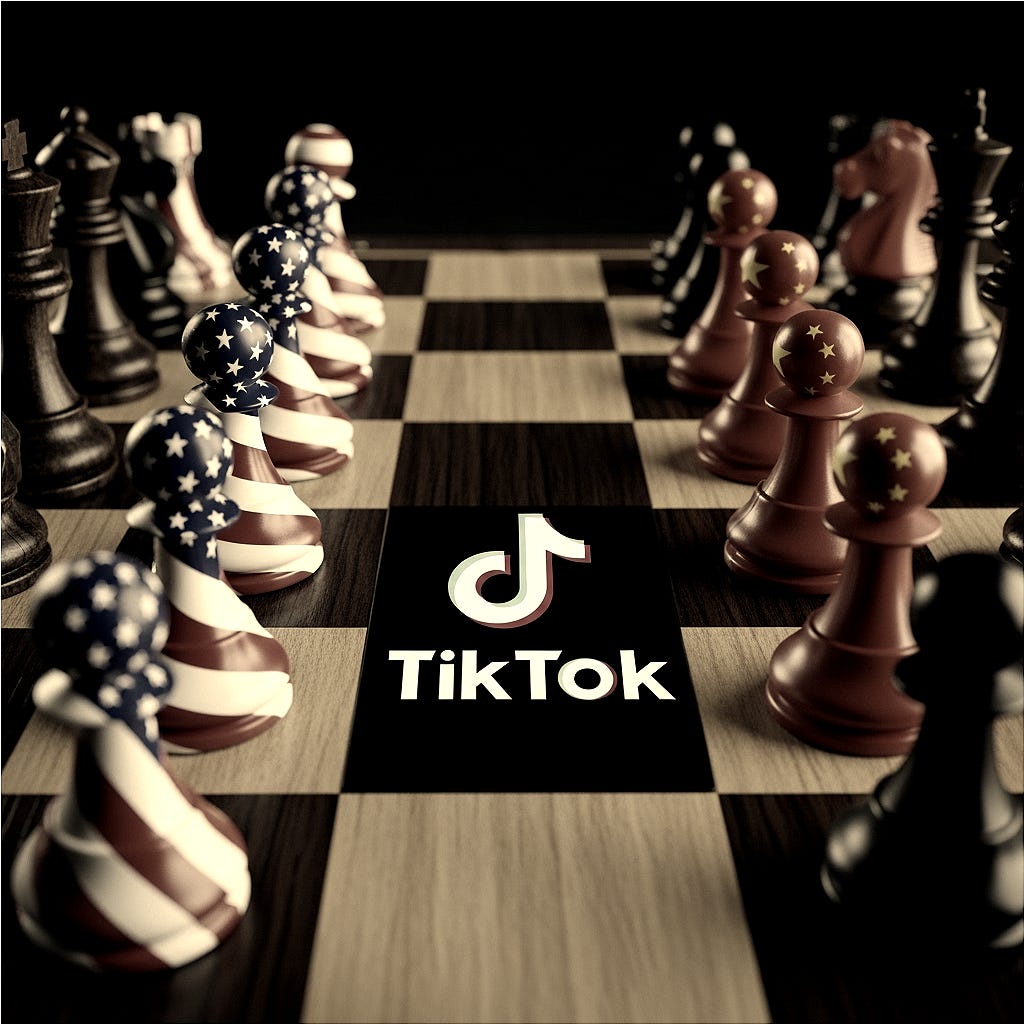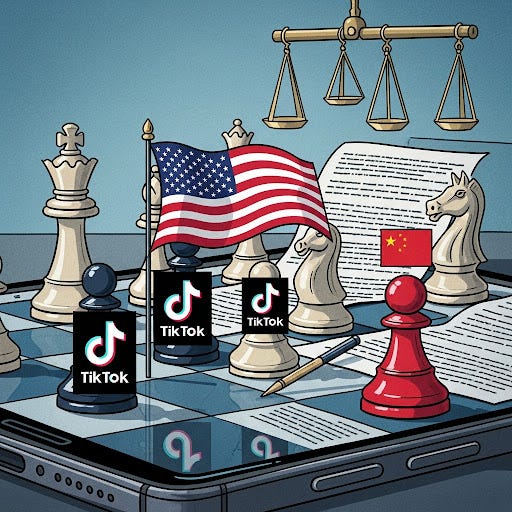TikTok Is Navigating the Geopolitical Battle for Digital Safety
TikTok's continued operation in the U.S. despite an official ban, highlights a critical geopolitical standoff. This saga, masterclass in how national security concerns is shifting political interests
The High-Stakes Geopolitical Chess Match of TikTok has allowed it to continue operating despite the official ban enacted on January 20, 2025. This unprecedented situation, marked by a series of presidential reprieves, reveals a complex interplay \of legal ambiguity, strategic delays, and a high-stakes political chess match that extends far beyond a simple app ban.
For business leaders, this unfolding saga offers critical lessons in navigating geopolitical risk, understanding regulatory frameworks, and anticipating the unexpected turns of digital policy.
The Legal Hammer: A New Era of Digital Sovereignty
The legal foundation for the TikTok ban stems from the "Protecting Americans from Foreign Adversary Controlled Applications Act” a bipartisan bill overwhelmingly passed by Congress in March 2024 and signed into law in April. This legislation represents a significant shift in the U.S. government's approach to the national security implications of foreign-owned digital platforms.
The Act targets explicitly mobile applications "subject to substantial control by a foreign adversary," explicitly naming TikTok. Its core mandate is clear: ByteDance, TikTok's Chinese parent company, must divest its U.S. operations to an American-approved entity or face an effective ban on distribution and hosting by U.S. companies like Apple and Google. This isn't an outright prohibition on the app itself, but rather a strategic chokehold designed to compel a change in ownership.
The Core Concerns around Data, Influence, and National Security
The legislative drive to curtail TikTok's U.S. operations is rooted in two paramount concerns:
Data Vulnerability: Lawmakers fear the potential for mass data collection on American users by hostile foreign government agencies, leveraging ByteDance's control.
Algorithmic Manipulation: TikTok’s robust recommendation algorithm could be weaponized to influence American public opinion through targeted content, posing a direct threat to democratic processes.
Senator Mark Warner (D-VA), Chair of the Senate Intelligence Committee, articulated during the debates, "We must prevent foreign adversaries from exploiting our digital vulnerabilities to influence democracies and surveil our citizens."
His statement underscores a growing global imperative among governments to assert digital sovereignty and protect national interests in an increasingly interconnected world.
The Unseen Influence And TikTok's Impact on Youth and the Spread of Divisive Narratives
Beyond the geopolitical and economic battles, a more insidious concern quietly permeates the TikTok debate: its profound and often negative influence on younger generations. The platform's addictive design, coupled with its robust, opaque algorithm, has created an environment where impressionable minds can be exposed to harmful content and radicalizing viewpoints, raising critical questions about digital citizenship and corporate responsibility.
The Cognitive Toll of Short-Form Video
Studies are highlighting the detrimental effects of excessive short-form video consumption on children and adolescents. The negative correlation between short video usage and academic performance is not only confirmed but also often mediated by shorter attention spans. Psychologists like Dr. Marny Lishman have warned that TikTok "addictive-type behaviors" in kids is directly contributing to a decline in attention. One study, involving elementary school students, found that higher usage of short videos was linked to difficulties in maintaining focus on academic tasks and reduced performance on standardized assessments.
The rapid, high-stimulation nature of TikTok content triggers dopamine surges, creating a cycle of dependency. This constant influx of information can make it difficult for developing brains to wind down, leading to sleep disruption, increased anxiety, and even depressive symptoms. The "infinite scrolling" design, while boosting engagement metrics for the platform, can paradoxically increase feelings of boredom over time and contribute to academic procrastination.
When Algorithms Go Astray By Design: The "Bin Laden Letter" Incident
The platform's content moderation challenges were starkly exposed in November 2023 when Osama bin Laden's 2002 "Letter to America" went viral among a new generation of TikTok users. The letter, which attempts to justify the 9/11 attacks and criticizes U.S. foreign policy, gained millions of views, with some users claiming that "everything we learned about the Middle East, 9/11, and 'terrorism' was a lie." This video is no longer available.
TikTok claimed it was "proactively and aggressively removing those contents" and that reports of it trending were "inaccurate", the incident underscored the platform's struggle to control the rapid dissemination of extremist and misleading narratives. The effort, perhaps intentionally, arrived too late to prevent the detrimental effect. The White House spokesperson Andrew Bates condemned the spread of "repugnant evil and anti-Semitic lies that the leader of al-Qaeda issued just after committing the worst terrorist attack in American history." This episode highlighted how quickly dangerous ideas can proliferate, particularly among a youth demographic that increasingly relies on TikTok for news. A Pew Research Center study revealed that approximately 43% of TikTok users rely on the app for their daily news, a significant increase from 22% the previous year.
Promoting Anti-Western Sentiments and Divisive Narratives
Beyond the famous incidents, concerns persist about TikTok's potential to amplify narratives that align with Chinese Communist Party (CCP) objectives, including those critical of Western values. Furthermore, some research suggests that TikTok's design encourages the virality of political content, enabling a very young segment of users to become producers and consumers of politically charged messages.
Studies have examined how the platform may be manipulated to conceal content critical of China while amplifying narratives that align with the CCP's objectives. One study indicated that heavy TikTok users exhibited "significantly more positive attitudes toward China's human rights record and expressed greater favorability toward China as a travel destination." Critics argue that these digital tactics are often invisible to users, making them particularly effective in altering public perception without being overtly detected.
The platform's algorithm can create "online echo chambers," leading to users becoming radicalized on either side of the political spectrum. This environment can normalize extreme statements and foster a rapid spread of once-peripheral beliefs. While TikTok provides a space for diverse voices, including marginalized groups challenging stereotypes, it also faces the immense challenge of preventing the proliferation of hate speech, misinformation, and content that actively undermines democratic values and promotes divisive ideologies among its vast youth audience. The ongoing debate over TikTok's future in the U.S. is thus not just about data security or economic leverage, but fundamentally about the battle for influence over the next generation's worldview.
Political Calculus and Shifting Sands
While the initial passage of the Act garnered strong bipartisan support, the post-vote political landscape has become far more nuanced. Republicans initially championed the bill as a firm stand against Chinese influence, with Rep. Mike Gallagher (R-WI) famously calling TikTok the "digital Trojan horse of the Chinese Communist Party." Democrats, while aligned mainly on national security, voiced concerns about freedom of expression and potential executive overreach, exemplified by Rep. Alexandria Ocasio-Cortez's (D-NY) objection to banning a platform used by 170 million Americans without a whole public debate.
The most notable shift, however, came from Donald Trump. After initially advocating for a TikTok crackdown, he reversed course in March 2025, recognizing the app's significant electoral demographic. His claim that "Taking away TikTok would make millions of young Americans very angry" highlights the powerful intersection of digital platforms and electoral politics, significantly complicating the enforcement of the law and contributing to the successive postponements.
The Divestiture Deadlock: A Geopolitical Standoff
The path to compliance has been anything but smooth. In April, a promising deal emerged with a consortium led by Oracle, alongside existing U.S. investors, proposing to acquire up to 80% of TikTok's U.S. operations. This arrangement aimed to adhere to the 20% foreign ownership cap mandated by law.
However, the Chinese government reportedly scuttled the deal at the eleventh hour, citing new trade tensions and invoking its "golden share" in ByteDance—a mechanism granting Beijing veto power over key decisions. As Samm Sacks, a senior fellow at the Council on Foreign Relations, summarized, "Beijing will never approve the transfer of strategic algorithmic assets to a foreign power." Even a compromise allowing ByteDance to retain algorithm control while Oracle oversaw data security failed to win Beijing's approval, demonstrating China's strategic intent to protect its technological assets.
The Uncharted Territory: Legal Ambiguity and Political Will
With three extensions already granted, the legal landscape surrounding TikTok remains highly uncertain. Legal scholars question the constitutional validity of these delays, suggesting they bypass Congressional oversight. While formal legal challenges have yet to materialize, digital rights groups are reportedly preparing lawsuits, indicating that this saga is far from over.
For now, TikTok operates in a carefully maintained legal grey zone. As Shane Tews, a senior fellow at the American Enterprise Institute, aptly concludes, "The law is clear, but its enforcement is ambiguous. The real issue is no longer legal—it’s political." This statement encapsulates the current challenge for business leaders: navigating a regulatory environment where political considerations and geopolitical maneuvering can sway legal mandates.
The TikTok situation serves as a critical case study for global businesses, underscoring the imperative to monitor geopolitical shifts, understand the evolving legal landscape of digital regulation, and prepare for scenarios where national security concerns can rapidly transform market access and operational freedom.
What strategic implications does this ongoing situation hold for the protection of American customers of foreign-owned tech companies operating in the U.S.?
Think Encore !



